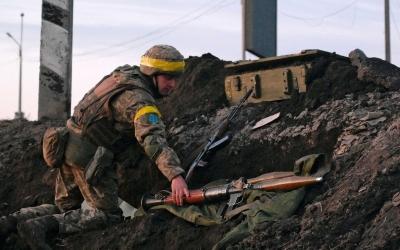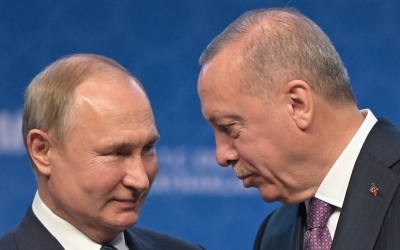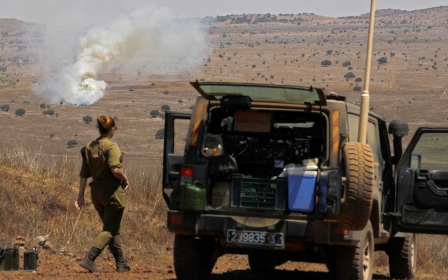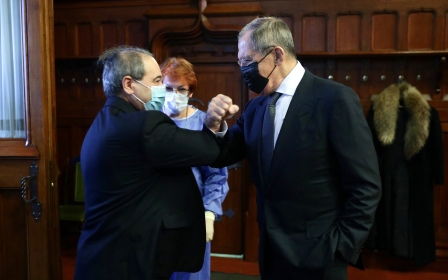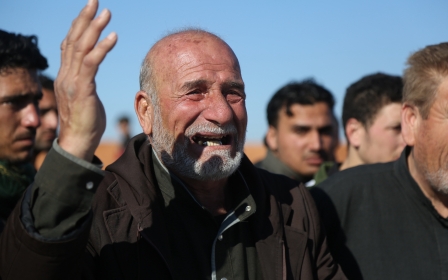Russia-Ukraine war: How Syrians in Idlib feel about crisis
Civilians in war-torn Syria have been watching the Russian invasion of Ukraine with mixed feelings. For many, the war recalls their own plight.
Russian President Vladimir Putin has backed his Syrian counterpart Bashar al-Assad since 2011, when a revolution against Assad turned into a protracted civil war that has displaced some 13 million people and killed nearly half a million, according to the United Nations.
As soon as the Russian invasion of Ukraine began on Thursday, Aziz al-Asmar, a Syrian graffiti artist, was preparing to paint a mural expressing solidarity with Ukraine.
'Eleven years after the war and western sanctions, Assad is still in his palace in Damascus and Putin supports him and directs him from his palace in Moscow'
- Aziz al-Asmar, Syrian artist
“My colleagues and I have painted murals on the walls of our houses destroyed by Putin-backed Assad, to show our support for the Ukrainian people,” Asmar told Middle East Eye.
“Russia does not care about shedding the blood of thousands of innocent people, for its own interests,” Asmar said, from in front of a mural he painted on the wall of a house bombed during the war east of Idlib province.
“We have suffered a lot by false Russian promises. I hope the Ukrainians will not suffer,” he added.
Exhausted Syrian opposition forces are now gathering in Idlib province and northern Aleppo province in the northwest of the country, closely monitoring the start of the Russian invasion of Ukraine.
Turkey, an ally of the Syrian opposition, and Russia, a government ally, have been overseeing a ceasefire marred by Russian and Syrian bombing and air strikes since it was announced in early 2019.
There was an increase in air strikes between 25 December and 5 January, with the United Nations saying on Monday that air strikes and shelling killed at least 11 civilians and injured 32 in January.
Russia claimed weeks ago that its forces were not intending to invade Ukraine, and before the invasion claimed that it had withdrawn troops from near the border with its neighbour.
“The United Nations, the Security Council and the European Union are all responsible for Russian attacks in Syria and Ukraine, and issuing sanctions will not stop Putin,” Asmar said.
Washington, the United Kingdom and the EU have imposed tough sanctions on Syrian officials for war crimes, and western sanctions have also been imposed on Russia for supporting Assad.
“Like Ukraine, western countries have promised us harsh sanctions against Putin, but all their promises and sanctions are empty,” Saad Alkhabous, an activist based in Idlib, said.
“Eleven years after the war and western sanctions, Assad is still in his palace in Damascus and Putin supports him and directs him from his palace in Moscow,” he told MEE.
“I advise my Ukrainian brothers to resist so that they do not die like Syrians in tents waiting for UN aid,” Alkhabous said.
“If the international community does not act now, when is it supposed to act? What does Russia bring other than destruction”? Fatima Bekur, an activist based in Idlib, asked.
“I stand with the Ukrainian people and hope that the international community will not abandon them to the crimes of the Russian army, as we were,” Bekur told MEE.
“Civilians are the biggest losers in war. They will suffer fear, displacement, deterioration of the economic situation and the loss of their property and service facilities,” she added.
Ongoing massacres
Russia has committed at least 357 mass killings of civilians in Syria since it began its military operations in Syria in 2015, according to the Paris-based Syrian Network for Human Rights.
Russia has also launched more than 1,200 attacks on vital facilities, including hospitals, schools and markets, and used its veto 16 times for Assad at the UN Security Council, according to the NGO.
Russia operates in Syria by supporting local forces along with fighters from the Wagner Group, a Russian mercenary group under western sanctions.
Local Syrian media claimed late last month that Russia had recruited between 2,500 and 4,000 pro-Assad Syrian mercenaries to fight in Ukraine, paying them $700 per month.
In northern Aleppo province, Hamid Baaj, a civil society activist, believes Russia is trying to change the contours of the world order, indifferent to the destabilisation of international security, and irrespective of sanctions.
“However, Russia is already mired in sanctions, and the West's bets on Russia's stumbling in Syria have not worked,” Baaj told MEE.
Hasa al-Ali, a student at Idlib University, agrees with Baaj and says that the attack on Ukraine may end within days with minimal losses.
“The attack aims to expand Russia’s influence by replacing the pro-EU Ukrainian government with a pro-Russian one,” al-Ali, who uses a pseudonym for security reasons, told MEE.
“Unfortunately, innocent people will die, but the Ukrainians will not suffer the same displacement as the Syrian people,” she added.
For Bassam Modal, a teacher in Idlib, Putin is trying to restore the glories of the Soviet Union by allying with China to create a new international bloc facing US. This will not help the Russian president in the long term, Modal believes.
“Putin may eventually take over Ukraine but that is not a victory,” he told MEE. “In the long run, the economic sanctions will work and we will see the collapse of Russia again."
“The potential collapse of Russia will constitute a victory for justice, Ukraine, the Syrian revolution, and the blood of thousands of innocent civilians around the world.”
Middle East Eye propose une couverture et une analyse indépendantes et incomparables du Moyen-Orient, de l’Afrique du Nord et d’autres régions du monde. Pour en savoir plus sur la reprise de ce contenu et les frais qui s’appliquent, veuillez remplir ce formulaire [en anglais]. Pour en savoir plus sur MEE, cliquez ici [en anglais].


